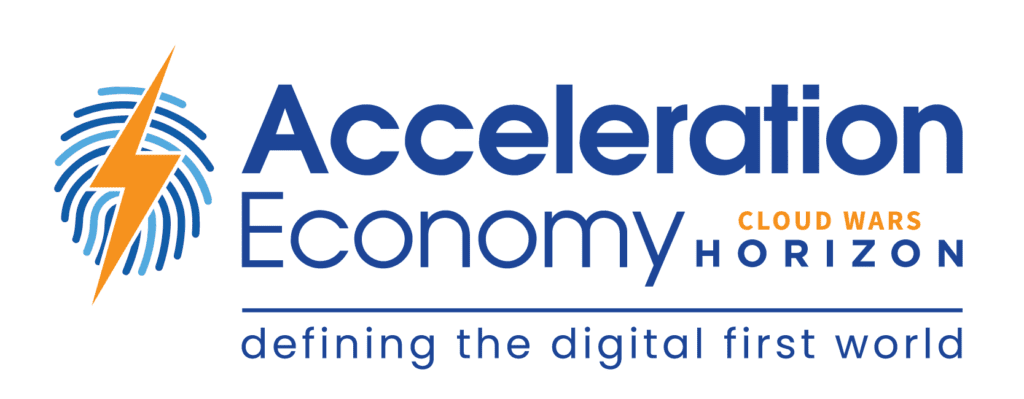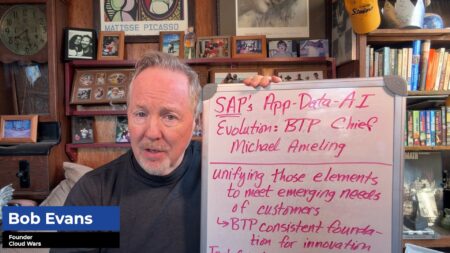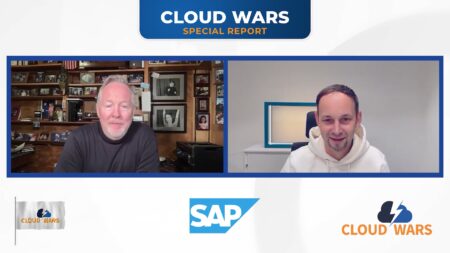In case you missed it, two days ago we published a video interview with Celonis Co-CEO Alex Rinke. The backdrop was the announcement that Celonis had secured an additional $1 billion in funding, pushing its total funding well over $2 billion and its valuation into the $13 billion range.
That’s heady stuff for a private company of any size, but Rinke nonetheless conversed in a laid-back, expansive way with Acceleration Economy co-founder John Siefert and myself.
In our discussion, we covered lots of ground but there are five key points in particular for which we’d like to provide additional context. Each of the points speaks directly to a hot-button business or tech issue that our readers are grappling with today, so Rinke’s insights are especially timely.
1. ‘Surge in Demand’
Here’s what Rinke said: Celonis is experiencing a “surge in demand” because it helps customers run their business better by optimizing day-to-day operations. That message is very relevant at this time because customers are battling against a range of factors that we’ll cover in point 2 below.
To put it mildly, it’s unusual in late 2022 to hear a tech leader refer to customer demand in such terms. One gets the sense from financial reporting by tech companies that there are a few top performers out there (including several in the Cloud Wars Top 10) and many others that need to scratch and claw for every dollar in trying to meet the expectations of the investor community. Of course, as a private company, we don’t have visibility into Celonis’ financials, but I’m fairly confident that the investors and banks that pumped a billion dollars into this company wouldn’t be doing so if that surge in demand was hyperbole.
2. Supply Chain Assumptions ‘Turned Upside Down’
Companies are struggling with inflation, availability of supplies, potential recession, and more. “All the assumptions they had about their supply chain, all the assumptions about lead times were all sort of turned upside down,” Rinke said. What they want execution management to do is deliver insights to realize optimizations in costs, product availability, and reliability of supply chains.
If you want to get a tangible feel for how supply chains are disrupting businesses and impacting their financial results, tune in to an earnings call or two for a retailer or big tech supplier. Things will pretty quickly turn into a discussion about the “macro” environment. Having sat through Walmart, Target, Cisco, and Zoom calls in the last week or so, I’ll make the argument that the calls were as much about macro, supply chain, and inventory issues as they were about reported results. That’s because macro and supply chain right now are arguably the biggest drivers in what will happen next quarter — and that’s the insight investors and analysts are really looking for.
3. No ‘Re-Platforming’ Required
Companies experienced IT sprawl in the last decade and earlier as they installed new systems to support selling online, digital engagement, sales automation, and more. That’s a lot of complexity to manage. “We provide the ability to say ‘that’s OK, that’s reality.’ Don’t try to reverse gravity and try to re-consolidate everything into one system,” Rinke says. “It’s not going to work anyway.”

“Don’t try to reverse gravity and try to re-consolidate everything into one system…It’s not going to work anyway.”
Alex Rinke, Celonis co-founder and co-CEO
Embracing execution management, by contrast, allows customers to understand how their business is running across all their different processes, without “re-platforming” their core systems.
It seems to me that the “overlay” or “layering” model that Celonis uses — sitting on top of core business systems in an agnostic fashion while recommending ways for systems and processes to work better — is a critical value proposition for today’s stressed-out business and tech execs. What would you rather sell: a wholesale changeover to new systems when current processes aren’t functioning well, or an overlay that makes current processes work better, and saves money?
4. ‘We Wouldn’t Have Believed’ Some Customer Use Cases
When it comes to engaging with customers, Celonis aims to deliver more value and do so faster. Rinke noted that customers have deployed its software to support applications and use cases that the company would have never considered. Airlines and retail customers, for instance, use it to optimize people-related processes and make their workforces more productive. “Sometimes they take our platform in places we wouldn’t have believed,” he said, as they are looking to understand how they can optimize lead times, on-time delivery, and relationships with suppliers. “Customers are always taking us into new places and we think, how can we enhance their journey and make it even better.”
That’s a great example of the urgency that Rinke referenced in the company’s funding announcement when he said “We have never experienced more urgency from customers to use Celonis…” Customers need ways to operate better and more efficiently across their business, so it’s incumbent upon software providers to understand customer needs holistically and either 1) meet them with their software or 2) assemble a solution that includes their products and those of others.
5. ‘We Can Only Understand a Small Portion of Domains’
To follow the preceding point, Rinke said the company can’t assemble the skills and knowledge to address all needs in all industries. It has a strong set of integration and consulting partners (close to 2,000 by my latest count), but needs to do more in that regard; additional funding should help.
“We can only understand a small portion of domains and there’s a huge opportunity in the ecosystem.” For that reason the company partners with ISVs, integrators, strategy consultants, and business process optimization experts. Plus, it’s not tied to any one system of record; rather, it integrates broadly. “That gives us the ability to build a really deep ecosystem centered around delivering innovation and customer value.”
Big consulting and integration firms will give any software company a far larger footprint, adding deep customer relationships and industry expertise. A massive round of new funds makes more of those partnerships possible.
For more exclusive coverage of innovative cloud companies, check out Cloud Wars Horizon here:










